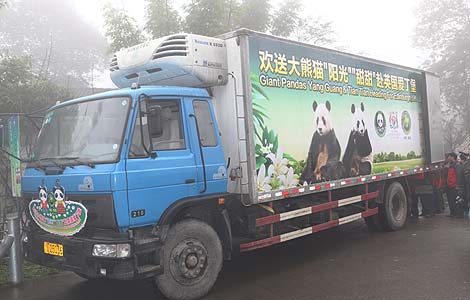CPI hits 14-month low
Updated: 2011-12-10 08:18
By Chen Jia, Hu Yuanyuan and Yu Ran (China Daily)
|
|||||||||
|
A sales assistant on the lookout for customers in a retail district in Beijing. China's producer price index hit a 23-month low of 2.7 percent year-on-year in November, from 5 percent in October. [Photo / Agencies] |
Leaders may shift focus to economic growth as level of inflation declines
BEIJING/SHANGHAI - Consumer prices in China rose by a lower-than-expected 4.2 percent in November, subdued by the cooling economic expansion which remains endangered by Europe's deepening debt crisis.
The expectation of even lower inflation next year, about 4 percent year-on-year, may leave more space for policymakers to shift their priority from reining in rising prices to stimulating economic growth, analysts said.
The nation's consumer price index (CPI), a main gauge of inflation, dropped sharply in November to a 14-month low of 4.2 percent, from 5.5 percent in October, after hitting a 37-month high of 6.5 percent in July, according to data posted on the website of the National Bureau of Statistics (NBS) on Friday.
In the January-to-November period, consumer prices jumped by 5.5 percent year-on-year, the bureau said.
But inflation has declined now for four consecutive months, thanks to the falling prices of food and some imported raw materials, signaling "that economic policies in the coming year may tilt toward stabilizing growth", said Li Yang, deputy head of the Chinese Academy of Social Sciences and a former adviser to the central bank.
Policymakers are expected to hold their annual economic work conference next week to set the framework for economic policy for 2012. Some media and financial institutions have forecast that the theme of that conference might be "stabilize".
Food prices, which account for about 30 percent of the products and services monitored for the CPI statistics, increased by 8.8 percent in November compared with last year - the figure was 11.9 percent in October. Pork prices declined by 5.3 percent month-on-month, and vegetable prices by 6 percent, the NBS reported.
"The pork I just bought cost 21 yuan ($3.3) a kilogram, a good deal less than the 30 yuan it cost about four months ago," said Yang Xia, a 62-year-old retired worker shopping in a Beijing supermarket.
Li Daokui, an adviser to the monetary policy committee of the People's Bank of China, the central bank, predicted on Friday that whole-year CPI may drop to 2.9 percent in 2012, and could be 5.4 percent this year.
The producer price index rose 2.7 percent year-on-year in November, a 23-month low, from 5 percent in October, because of falling international commodity prices and shrinking domestic and overseas demand, according to the NBS.
Industrial output growth rose by 12.4 percent year-on-year, according to the NBS, the slowest pace in more than two years, indicating rapidly weakening economic growth.
"This is being driven by softening export growth and the rapidly cooling property market," said Zhang Zhiwei, chief economist at Nomura Securities (Hong Kong) Co Ltd.
Hu Xudong, director of Zhejiang Fuyang Jin'aobo Shoe Co Ltd, said he's worried about his business in the coming year.
"The export volume of our shoes next year is likely to drop because overseas orders are shrinking," said Hu. "Also, rising labor costs may continue to cut our profits."
Last month, growth in fixed-asset investment slowed to 24.5 percent, 0.4 percentage points lower than in October. Real estate investment growth dropped to 29.9 percent in November from October's 34.2 percent, according to the NBS statistics.
On Dec 1, the central bank announced that it would lower the reserve-requirement ratio (RRR) for commercial banks by 50 basis points, the first cut since December 2008. Many economists predicted that monetary policy may ease further in 2012, including at least two cuts in RRR in the first half, because of the gloomy outlook for the global economy.
Zhu Min, deputy managing director of the International Monetary Fund, said on Friday that emerging economies are not immune to Europe's debt crisis, which threatens the stability of their economic systems. "The risk of economic slowdown in Asian countries is surging," he said.
According to Pu Yonghao, chief investment strategist with UBS Asia-Pacific, European countries and the United States may continue to loosen monetary policies while tightening fiscal policies to lower their unemployment rates and stimulate economic growth.
The US government will probably embark on a third round of quantitative easing next year if Europe slides into a recession and the US housing market continues to fall. This could increase market liquidity and bring imported inflationary pressure to China, he said.












